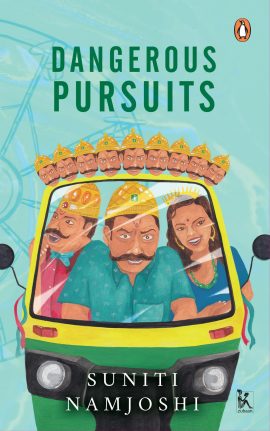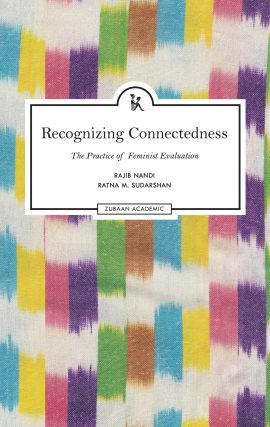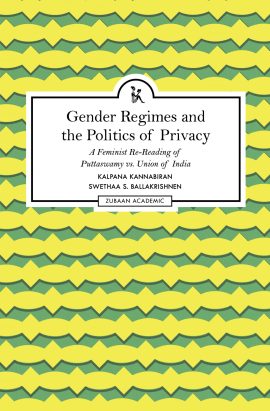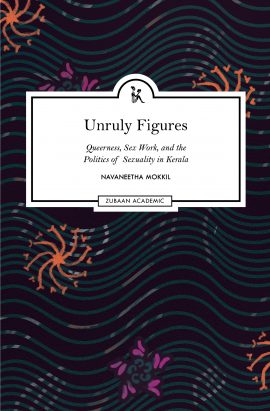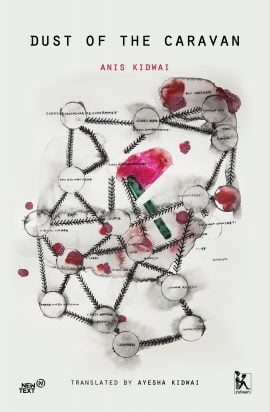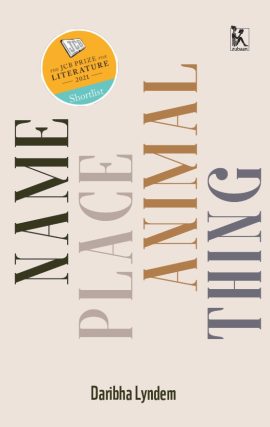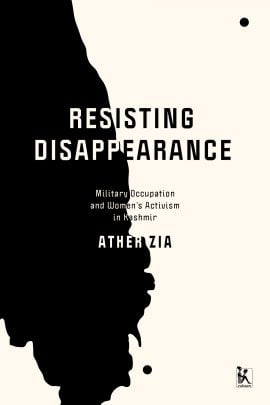No products in the cart.
Return To Shop
Log in / Sign in
Login
Register
Filter by price
A Small Step in a Long Journey: A Memoir by Akkai Padmashali
₹ 325 – ₹ 495Price range: ₹ 325 through ₹ 495
More than just an autobiography or memoir, this is a powerful and passionate account of one woman’s battle to claim her identity and place in society. In A Small Step in a Long Journey, Akkai Padmashali, a trans rights activist and campaigner, thinker, writer, poet, and actor, throws out a challenge to society, demanding not sympathy or pity but acceptance, recognition, and respect. Brutally honest and self-critical, Akkai’s writing is a political act in which she lays bare the hurt, humiliation, confusion, insult, love, solidarity, and joy that went into making her who she is today.Time and again Akkai asserts that her story is not just her story. What we call gender and sexuality, she says, ‘is a journey we all travel’, one that connects our personal and political lives, and one that helps us to face difficult, disturbing questions about prejudice and privilege.
AKKAI PADMASHALI is a trans rights activist, writer, singer, performer, and motivational speaker. She has been a champion for queer and trans rights, an advocate for policy change and a recipient of Karnataka government second highest civilian honour, the Rajyotsava Prashasti. She has also received an honorary doctorate from the Indian Virtual University for Peace and Education. Founder of Ondede, a human rights organization, Akkai’s was among the leading voices opposing Section 377 of the Indian Penal Code, which criminalized homsexuality. She has been a strong critic of the Transgender Persons (Protection of Rights) Act, 2019 and the 2018 and 2016 bills that preceded it.
Select format
This product has multiple variants. The options may be chosen on the product page “…leaves you unsettled. Akkai means to disturb and disrupt us.” — Vrinda Grover, lawyer and women’s rights activist
“Akkai Padmashali’s forceful and eloquent new book, A Small Step in a Long Journey, tells of the awe-inspiring life of this eminent activist. From the harrowing abuse she has faced to her ironclad determination to change attitudes toward the transgender community, Akkai’s story is an indictment of society’s cruelty toward those it deems to be different, and an inspiration to anyone who wishes for a more just world.” — Shashi Tharoor, author and politician
AKKAI PADMASHALI is a trans rights activist, writer, singer, performer, and motivational speaker. She has been a champion for queer and trans rights, an advocate for policy change and a recipient of Karnataka government second highest civilian honour, the Rajyotsava Prashasti. She has also received an honorary doctorate from the Indian Virtual University for Peace and Education. Founder of Ondede, a human rights organization, Akkai’s was among the leading voices opposing Section 377 of the Indian Penal Code, which criminalized homsexuality. She has been a strong critic of the Transgender Persons (Protection of Rights) Act, 2019 and the 2018 and 2016 bills that preceded it.
Searching for the Songbird
₹ 295 – ₹ 375Price range: ₹ 295 through ₹ 375
Kastura, ‘the Songbird’, has disappeared. She is the prime suspect of a burglary in the Himalayan foothills, and twelve-year Johnny Raut is determined to find her and prove her innocence. The problem is that he has just moved to the mountains from Mumbai, and knows almost nothing about his new surroundings. While coping also with his parents’ separation, he joins forces with three of his classmates and sets out to find the missing Songbird.As Johnny solves the mystery of her disappearance, he must also come to terms with his own fears, understand the social prejudices that affect people close to him, and become familiar with the songs and sounds of this alien environment.
RAVINA AGGARWAL is an anthropologist who has written extensively about the Himalayas. Her publications include Beyond Lines of Control: Performance and Politics on the Disputed Borders of Ladakh, India and two edited volumes, Into the High Ranges: The Penguin Book of Mountain Writing and Forsaking Paradise: Short Stories from Ladakh. She was a tenured professor at Smith College, Massachusetts, and has worked for the Ford Foundation in New Delhi, before assuming her current position as the director of Columbia University’s Global Center in Mumbai.
Select format
This product has multiple variants. The options may be chosen on the product page “Searching for the Songbird is an exciting mystery for younger readers with a number of provocative themes wrapped up inside a compelling thriller about a puzzling disappearance.“ — Stephen Alter, author of several award-winning works of fiction and non-fiction, including Birdwatching: A Novel
“The serenity of the hills juxtaposed with the unsettling realities of crime and social conditions. An exciting read.“ — Paro Anand, award-winning author and a recipient of the Sahitya Akademi Bal Sahitya Puruskar for her anthology Wild Child and Other Stories
RAVINA AGGARWAL is an anthropologist who has written extensively about the Himalayas. Her publications include Beyond Lines of Control: Performance and Politics on the Disputed Borders of Ladakh, India and two edited volumes, Into the High Ranges: The Penguin Book of Mountain Writing and Forsaking Paradise: Short Stories from Ladakh. She was a tenured professor at Smith College, Massachusetts, and has worked for the Ford Foundation in New Delhi, before assuming her current position as the director of Columbia University’s Global Center in Mumbai.
Dangerous Pursuits
₹ 250 – ₹ 499Price range: ₹ 250 through ₹ 499During the current COVID-19 surge we are shipping orders from Delhi once per week. Please allow 8-10 business days for delivery.
Hilarious, lyrical, witty and disturbing, these three different tales all point to the question: if all our dreaming ends in distortion and disappointment, what may we do? Write ourselves off as a failed species and let climate change lead us to well-deserved oblivion? Or keep trying to do better with more humility and an acceptance that perfection remains a distant signpost?In “Bad People”, Ravana, Shupi and Kumbh manage to make the world veer from its destructive course and buy time for us. Ravana, of course, belongs to epic—but how does he fit into the twenty-first century? With the help of Grandma Ketumati’s balm, these three “bad” people outwit contemporary villains. In “Heart’s Desire”, an old woman seeks to make a bargain with the devil, but the devil isn’t interested, and she finds herself stuck with two angels. She and the angels do their best, but the old woman learns that a happy end and heart’s desire are not synonymous.And in “The Dream Book”, based on The Tempest, Caliban, Miranda, Prospero and the rest find that their dreams clash and lie there as pretty and pitiless as glass shards. Yet, each time they engage once again in this dangerous pursuit.“She is a fabulist who is never preachy. A feminist who is never humourless. A poet who is never arcane. An intellectual who is never pedantic… Her work points to a deeply internalized radicalism, one that has as much depth as it has edge. Quirky, funny, intellectually agile, capable of making connections between the mundane and the metaphysical, adept at sniffing out the archetypal in the culturally particular, they point to a mind that is as engaged as it is engaging.“ — Arundhati Subramaniam
SUNITI NAMJOSHI is a poet, a fabulist and a children’s writer who has written over thirty books. After a stint in the Indian Administrative Service, Namjoshi moved to Canada where she earned a PhD at McGill University, and then moved on to doing what she loves best: writing. A selection of her writings is published in The Fabulous Feminist (Zubaan, 2012). Suki (Zubaan-Penguin, 2013), a memoir about her beloved cat is both a book about a relationship and an elegy. Her recent work, Foxy Aesop: On the Edge asks point-blank whether it is the function of writers to save the world.
Homeward: Towards a Poetics of Space
₹ 550 – ₹ 1,200Price range: ₹ 550 through ₹ 1,200
In Homeward, Soibam Haripriya brings together writers, artists, poets and photographers to question presumptions of home, the idea of a homeland and, by extension, the nation. Articulating and imagining the meanings of home, one's own or those of others, is often an act of confronting one's vulnerability. Metaphorical or real, homes are necessarily messy worlds that inevitably collide and telescope into each other as their geographical boundaries often intersect and overlap. The contributors to this volume, in their different ways, upend the idea of home as a unit of stability, familiarity and familial-ity, emptying out its significance as a place of nostalgic refuge to which one can always return. The ostensibly common universal idea of home is often unhinged, they show, by the conditions of violence that underpin relations within that space. Focusing largely on the Northeastern region, often bound together in some way, ethnically and geographically, this anthology illuminates how political climate as well as geographic sites transform homes. How then may we re-imagine home when its significance as a space and place of refuge loses meaning. Homeward engages with the boundaries and constraints imposed by messy cartographies and attempts to evoke a poetics of space through the act of writing.
Contributors: Agastaya Thapa | Amorette Grace Lyngwa | Amrapali Basumatary | Bhagwati Prasad | Gayatri Thangjam | Janice Pariat | Kumam Davidson Singh | Lapdiang Artimai Syiem | Leki Thungon | Ma Thida | Malsawmi Jacob | Mamang Dai | Mouma Mog | Pandora | Parismita Singh | Prashansa Gurung | Priyadarshini Moirangthem Chanu | Rubani Yumkhaibam | Rongnyoo Lepcha | Mongfing Lepcha | Shalim M Hussain | Soibam Haripriya | Thejakhrienuo "Thej" Yhome | Vishü Rita Krocha
SOIBAM HARIPRIYA is a poet and researcher. Her work has appeared in several anthologies including Centrepiece: New Writing and Art from Northeast India (2017), published by Zubaan, 40 Under 40: An Anthology of Post-Globalisation Poetry (2016) and A Map Called Home (2018). She has also been published in Muse India (May-June 2019), Poetry at Sangam (July 2019) and the Sahitya Akademi journal, Indian Literature. She is presently a postdoctoral fellow at the Department of Conflict and Development Studies, Ghent University, Belgium.
Select format
This product has multiple variants. The options may be chosen on the product page Contributors: Agastaya Thapa | Amorette Grace Lyngwa | Amrapali Basumatary | Bhagwati Prasad | Gayatri Thangjam | Janice Pariat | Kumam Davidson Singh | Lapdiang Artimai Syiem | Leki Thungon | Ma Thida | Malsawmi Jacob | Mamang Dai | Mouma Mog | Pandora | Parismita Singh | Prashansa Gurung | Priyadarshini Moirangthem Chanu | Rubani Yumkhaibam | Rongnyoo Lepcha | Mongfing Lepcha | Shalim M Hussain | Soibam Haripriya | Thejakhrienuo "Thej" Yhome | Vishü Rita Krocha
SOIBAM HARIPRIYA is a poet and researcher. Her work has appeared in several anthologies including Centrepiece: New Writing and Art from Northeast India (2017), published by Zubaan, 40 Under 40: An Anthology of Post-Globalisation Poetry (2016) and A Map Called Home (2018). She has also been published in Muse India (May-June 2019), Poetry at Sangam (July 2019) and the Sahitya Akademi journal, Indian Literature. She is presently a postdoctoral fellow at the Department of Conflict and Development Studies, Ghent University, Belgium.
Recognizing Connectedness: The Practice of Feminist Evaluation
₹ 525 – ₹ 795Price range: ₹ 525 through ₹ 795
The concept of programme evaluation, now more than half a century old, refers to the practice of professional assessment of a programme that is informed by evidence and guided by evaluative thinking to arrive at a judgement about value, merit, worth, significance and utility. Good programme evaluations in general adopt an inclusive development approach rather than a transformative approach. Feminist evaluations, by contrast, identify a wide range of stakeholders and engage the larger community in order to identify, and encourage the programme to challenge social norms that perpetuate inequalities between men and women and other genders. The essays in this volume, in different ways, suggest that gender transformative change cannot happen through the actions or exercise of agency by one group alone – whether it is girls, or boys, or women. Instead the authors draw out the importance of ‘connectedness’ between groups of people and between individual agents and the larger structures within which they are located. In doing so, they apply a feminist lens to a range of programme evaluations and policies at both the national level and at the level of specific states (Uttarakhand, Delhi, Bihar, Haryana, Rajasthan and Tamil Nadu).
RAJIB NANDI is Associate Director at the Institute of Social Studies Trust, New Delhi with 22 years of experience in gender transformative research and evaluation. He has an M.Phil degree in applied Economics from the Centre for Development Studies, a doctoral degree in Sociology from Jawaharlal Nehru University, New Delhi and a post-graduate certificate in Development Evaluation (IPDET) from the University of Bern. Rajib’s areas of work cover gender and development, social and solidarity economy, information and communications technologies, programme evaluations, and evaluative studies. He is a founder and core group member of the Evaluation Community of India. Presently he is the Governing Board Member of the Community of Evaluators–South Asia and a Council Member with the International Evaluation Academy (IEAc). RATNA M. SUDARSHAN is a Trustee and former Director of the Institute of Social Studies Trust (ISST). She has been on the research staff at the National Council of Applied Economic Research and a National Fellow at the National Institute of Educational Planning and Administration. Her research has mainly focused on the linkages between women’s work, the informal economy and education.
Select format
This product has multiple variants. The options may be chosen on the product page "This rich volume deepens understanding on the theory and practice of feminist evaluation. It offers insights on whether programmes and policies can address gender inequities, especially when they are designed, implemented, and evaluated in systems that are deeply inequitable. The authors grapple with, and push against, the limitations of traditional evaluation frameworks. They explore institutional factors and barriers which shape and impede individual agency, choice, aspirations, and behaviours, and offer new approaches, insights, tools, and frameworks for other evaluation theorists and practitioners...Spanning feminist and Dalit theory, evaluation theory, gender programming, and covering a range of different sectoral programme cases while also moving between the conceptual and practical, this rich volume offers both new insights and practical tools for deepening feminist evaluation practice." — Katherine Hay, Deputy Director, Bill and Melinda Gates Foundation
RAJIB NANDI is Associate Director at the Institute of Social Studies Trust, New Delhi with 22 years of experience in gender transformative research and evaluation. He has an M.Phil degree in applied Economics from the Centre for Development Studies, a doctoral degree in Sociology from Jawaharlal Nehru University, New Delhi and a post-graduate certificate in Development Evaluation (IPDET) from the University of Bern. Rajib’s areas of work cover gender and development, social and solidarity economy, information and communications technologies, programme evaluations, and evaluative studies. He is a founder and core group member of the Evaluation Community of India. Presently he is the Governing Board Member of the Community of Evaluators–South Asia and a Council Member with the International Evaluation Academy (IEAc). RATNA M. SUDARSHAN is a Trustee and former Director of the Institute of Social Studies Trust (ISST). She has been on the research staff at the National Council of Applied Economic Research and a National Fellow at the National Institute of Educational Planning and Administration. Her research has mainly focused on the linkages between women’s work, the informal economy and education.
Gender Regimes and the Politics of Privacy: A Feminist Re-Reading of Puttaswamy vs. Union of India
₹ 550 – ₹ 795Price range: ₹ 550 through ₹ 795
In 2017 an all-male nine-judge bench of the Indian Supreme Court delivered the landmark Justice K.S. Puttaswamy & Ors v. Union of India judgment on privacy. In this book, the authors look at the embodiment of privacy in the judgment to examine the ways in which the bench articulated the question of gender. They argue that while Puttaswamy has been central in clarifying the extent of (and extensions to) the right to privacy as a fundamental right, the discourse on this has long existed in India — in various gendered social movements, policy-making around women’s rights, feminist historiography, and discourses on the family, sexual rights, autonomy and choice (in and outside courts), dignity, and critiques of surveillance — and provides an important context within which the judgment becomes especially relevant.The authors unpack the underlying logics of the right to privacy within the default prism of the notional identity of the normative household and offer an entry point to re-read existing jurisprudence on rape, sexual assault, sexual harassment, atrocity, and sexual violence and humiliation under conditions of mass violence. They suggest a springboard for the possibility of theorizing personhood within the right to privacy, arguing that while the judgment sets up radical precedent on the questions of sexual minorities, it remains trapped in a reductionist reading of the female body within heteronormativity.
KALPANA KANNABIRAN works at the intersections of sociology, law, and gender studies. A co-founder of Asmita Resource Centre for Women, Secunderabad, she has taught at NALSAR University of Law, Hyderabad (1999-2009), and was a regional director at the Council for Social Development, Hyderabad (2011-2021). She is the author of Tools of Justice: Non-Discrimination and the Indian Constitution (2012) and editor of Violence Studies (2016), among others.SWETHAA S. BALLAKRISHNEN is an assistant professor of Law (and by courtesy, Sociology, Asian American Studies, and Criminology, Law and Society) at the University of California, Irvine. Their research, teaching, and service are primarily focused on law’s connection to actors and relationships at the periphery, usually around identities, queers, and souths. Their writings have appeared in several journals, and their books include Accidental Feminism (2021) and Invisible Institutionalisms (co-edited, 2021).
Select format
This product has multiple variants. The options may be chosen on the product page KALPANA KANNABIRAN works at the intersections of sociology, law, and gender studies. A co-founder of Asmita Resource Centre for Women, Secunderabad, she has taught at NALSAR University of Law, Hyderabad (1999-2009), and was a regional director at the Council for Social Development, Hyderabad (2011-2021). She is the author of Tools of Justice: Non-Discrimination and the Indian Constitution (2012) and editor of Violence Studies (2016), among others.SWETHAA S. BALLAKRISHNEN is an assistant professor of Law (and by courtesy, Sociology, Asian American Studies, and Criminology, Law and Society) at the University of California, Irvine. Their research, teaching, and service are primarily focused on law’s connection to actors and relationships at the periphery, usually around identities, queers, and souths. Their writings have appeared in several journals, and their books include Accidental Feminism (2021) and Invisible Institutionalisms (co-edited, 2021).
Off The Beaten Track
₹ 499
Saeeda Bano was the first woman in India to work as a radio newsreader, and she is still known as the doyenne of Urdu broadcasting. Over her unconventional and courageous life, Bano walked out of a suffocating marriage, witnessed the violence of Partition, lost her son for a night in a refugee camp, ate toast with Nehru, and fell in love with a married man who would, in the course of their twenty-five year-relationship, become the Mayor of Delhi. Though she was born into privilege in Bhopal—the only Indian state to be ruled by women for four successive generations—her determination, independence, and frankness provide a unique and crucial disruption in India’s understanding of the past. Translated from Urdu by Bano’s granddaughter, Off the Beaten Track is a frank and brave memoir about the remarkable life of a single woman in mid-twentieth-century India.
SAEEDA BANO is the first woman in India to work as a radio newsreader.SHAHANA RAZA is Saeeda Bano's grand-daughter. She has a Master's in Film and Viedo Production and has worked in television, radio and other print media. A liberal feminist, Shahana is an independent writer and video producer, a wannabe vegan and a dilettante environmentalist. She currently lives in Dubai with her husband and two children.
Add to cart
“Generously studded with jewel-bright Urdu and Farsi verses, ably translated by the author's granddaughter Shahana Raza, the narrative retains the flavour of its Urdu original. It reminds us of a time when even those with little formal education had a wide frame of literary references and a world view that was eclectic and liberal.“ — India Today
“But, what makes this memoir an important one, is also her professional strides at AIR. When AIR launched its Urdu service, she began taking on more programming work, leading a Women and Children's show, analysing news, broadcasting short bulletins, and also producing a five-minute show called Dekhi-Suni. In her memoir, she writes about this very matter-of-factly.“ — Midday
SAEEDA BANO is the first woman in India to work as a radio newsreader.SHAHANA RAZA is Saeeda Bano's grand-daughter. She has a Master's in Film and Viedo Production and has worked in television, radio and other print media. A liberal feminist, Shahana is an independent writer and video producer, a wannabe vegan and a dilettante environmentalist. She currently lives in Dubai with her husband and two children.
Intimate City
₹ 420 – ₹ 495Price range: ₹ 420 through ₹ 495
In this one-of-a-kind book, Manjima Bhattacharjya examines how globalization and technology have changed where and how sexual commerce is transacted. From changing red light areas to the world of escort services, massage boys and men in search of casual encounters cruising the internet highways, this book maps offline and online geographies of sex work and unearths voices never heard before. Through these fascinating narratives, Bhattacharjya tries to understand how the internet has re-configured intimacies in the digital age. In doing so, she offers a new lens to look at long-held feminist understandings of sex work, choice, consent and agency against the backdrop of the ‘maximum city’: Mumbai.
MANJIMA BHATTACHARJYA is a feminist researcher, writer and activist based in Mumbai. She has been part of the Indian women’s movement for over two decades. She holds a PhD in sociology. Her areas of specialization include gender and sexuality, and labour and the body. She is the author of Mannequin: Working Women in India’s Glamour Industry (Zubaan 2018).
Select format
This product has multiple variants. The options may be chosen on the product page MANJIMA BHATTACHARJYA is a feminist researcher, writer and activist based in Mumbai. She has been part of the Indian women’s movement for over two decades. She holds a PhD in sociology. Her areas of specialization include gender and sexuality, and labour and the body. She is the author of Mannequin: Working Women in India’s Glamour Industry (Zubaan 2018).
Unruly Figures: Queerness, Sex Work, and the Politics of Sexuality in Kerala
₹ 550 – ₹ 795Price range: ₹ 550 through ₹ 795
The vibrant media landscape of Kerala, where kiosks overflow with magazines and colourful film posters line roadside walls, creates a sexually charged public sphere that has a long history of political protests. The 2014 ‘Kiss of Love’ campaign garnered national attention, sparking controversy as images of activists kissing in public and dragged into police vans flooded the media.In Unruly Figures, Navaneetha Mokkil tracks the cultural practices through which sexual figures — particularly the sex worker and the lesbian — are produced in the public imagination. Her analysis includes representations of the prostitute figure in popular media, trajectories of queerness in Malayalam films, public discourse on lesbian sexuality, the autobiographical project of sex worker and activist Nalini Jameela, and the memorialization of murdered transgender activist Sweet Maria, showing how various marginalized figures stage their own fractured journeys of resistance in the post-1990s context of globalization.By bringing a substantial body of Malayalam literature and media texts on gender, sexuality, and social justice into conversation with current debates around sexuality studies and transnational feminism in Asian and Anglo-American academia, Mokkil reorients the debates on sexuality in India by considering the fraught trajectories of identity and rights.
NAVANEETHA MOKKIL is assistant professor at the Centre for Women’s Studies at Jawaharlal Nehru University. She is the co-editor of Thinking Women: A Feminist Reader.
Select format
This product has multiple variants. The options may be chosen on the product page ‘Unruly Figures provides a provocative and theoretically rich account of the uneven terrain of contemporary sexual politics.’ — Gender & Society
‘Social commitment and intellectual vigour make this journey adventurous, and the author transmits its spirit through her evocative, lyrical writing.’ — Review of Development Change
‘In the long history of writing about queer theory both in South Asia and beyond, Mokkil’s study is unique in bringing Kerala and sexuality studies together in a powerfully pointed yet capacious way.’ — Geeta Patel, Author of Risky Bodies and Techno-Intimacy: Reflections on Sexuality, Media, Science, Finance
‘Mokkil deftly reads, in an in-depth and sustained manner, a range of materials that constitute zones of publicity and intimacy in Kerala, drawing out how figurations of gender and sexuality mark this fraught terrain. Linking Indian and Anglo-American feminist and queer studies to these readings, the analysis makes a strong case for the importance of the regional as a site for new directions in critical scholarship.’ — Ritty Lukose, Author of Liberalizations’s Children: Gender, Youth, and Consumer Citizenship in Globalizing India
NAVANEETHA MOKKIL is assistant professor at the Centre for Women’s Studies at Jawaharlal Nehru University. She is the co-editor of Thinking Women: A Feminist Reader.
Dust of the Caravan
₹ 420 – ₹ 595Price range: ₹ 420 through ₹ 595
Dust of the Caravan is a selection of writings by Anis Kidwai sketching the personal and political journey of a Muslim woman through the first eight decades of the 20th century. In Kidwai’s often humorous and always incisive and compassionate telling of the travels that took her from a birth and upbringing in rural Awadh into the maelstrom of Partition and its aftermath, lies a rich tapestry of tales.Simultaneously a social history of life in rural Awadh in the early 20th century and the birth of the national movement in the region as well as an account of the traditions of mutual respect and understanding between different faiths in a shared culture and the rupture of those very traditions during Partition, this book is also the story of a woman’s journey from the home into the world and from ‘family values’ towards autonomous beliefs, friendships, and activism. In addition to its value as a literary work, Dust of the Caravan is an important resource in the fields of history, sociology, and gender studies.
Born in 1906 in Barabanki, ANIS KIDWAI was a member of the Rajya Sabha (1956-68) and a social activist, committed to secularism and the rights of minorities and women. Kidwai had a six-decade long literary career as an essayist, and is perhaps best known for her two collections of essays—Nazre Khush Guzre (1975) and Ab Jin ke Dekhne Ko (1978), as well as her sombre Urdu memoir of Delhi during Partition, Āzādi Ki Chhaon Mein. A prolific contributor to Urdu women’s journals and literary periodicals, Anis Kidwai perfected a highly individual style in which wit and sarcasm combined with perspicacious observation, literary allusion, and a progressive politics. In 1981, she was awarded the Sahitya Kala Parishad Award. She passed away on 16 July 1982.AYESHA KIDWAI teaches linguistics at Jawaharlal Nehru University and is Anis Kidwai’s granddaughter. She is also the translator of Āzādi Ki Chhaon Mein, which appeared as In Freedom’s Shade in 2011.
Select format
This product has multiple variants. The options may be chosen on the product page “An archivist’s delight, an emotional roller coaster, a challenge to settled opinions, a must read for everyone with a conscience who is thinking about the soul of India.“ — Uma Chakravarti, Historian
“Written in scintillating prose, rich in anecdotes, candid portraits, and everyday details, they open up for us the world at once intimate and expanding of the zenana..” — Francesca Orsini, SOAS University of London
“Ayesha Kidwai’s sensitive translation of her grandmother’s writing captures its multiple registers and unique expression to reveal a woman’s voice at once poignant, funny, piercing and poetic.” —Siobhan Lambert-Hurley, University of Sheffield
“Dust of the Caravan is a compelling story of knitting dreams of a just and equal India, a story of a struggle propelled only by hope, a story which, but for Ayesha Kidwai, would have remained inaccessible to a wider audience.” — Saif Mahmood, Writer, Translator, Lawyer
Born in 1906 in Barabanki, ANIS KIDWAI was a member of the Rajya Sabha (1956-68) and a social activist, committed to secularism and the rights of minorities and women. Kidwai had a six-decade long literary career as an essayist, and is perhaps best known for her two collections of essays—Nazre Khush Guzre (1975) and Ab Jin ke Dekhne Ko (1978), as well as her sombre Urdu memoir of Delhi during Partition, Āzādi Ki Chhaon Mein. A prolific contributor to Urdu women’s journals and literary periodicals, Anis Kidwai perfected a highly individual style in which wit and sarcasm combined with perspicacious observation, literary allusion, and a progressive politics. In 1981, she was awarded the Sahitya Kala Parishad Award. She passed away on 16 July 1982.AYESHA KIDWAI teaches linguistics at Jawaharlal Nehru University and is Anis Kidwai’s granddaughter. She is also the translator of Āzādi Ki Chhaon Mein, which appeared as In Freedom’s Shade in 2011.
Books, Books from the North East, Books from the North East, e-Books, Fiction, Fiction, New Releases, New Releases
Name Place Animal Thing
₹ 300 – ₹ 495Price range: ₹ 300 through ₹ 495Shortlisted for the JCB Prize for Literature 2021!
'There were no longer any signs of the house we stayed in, no doorway with its low entrance, no weeping willow or cryptomeria tree from which the caterpillars fell. The ramshackle cottage that housed my earliest friends and shaped my memories lay bare and forgotten. Only the flying termites remained, fluttering below the street lights outside the property.'In this novella, Daribha Lyndem gently lifts the curtain on the coming of age of a young Khasi woman and the politically charged city of Shillong in which she lives. Like the beloved school game from which it takes its name, the book meanders through ages, lives and places. The interconnected stories build on each other to cover the breadth of a childhood, and move into the precarious awareness of adulthood.A shining debut, Name Place Animal Thing is an elegant examination of the porous boundaries between the adult world and that of a child’s.
DARIBHA LYNDEM is a writer and civil servant from Shillong. Name Place Animal Thing is her first book. She currently works with the Indian Revenue Service and a Deputy Commissioner of Customs. Daribha now lives with two cats and a husband in Mumbai.
Resisting Disappearance: Military Occupation and Women’s Activism in Kashmir
₹ 645
Note: This book will be delivered via post to all states of India, except Jammu and Kashmir.In Kashmir’s frigid winter a woman leaves her door cracked open, waiting for the return of her only son. Every month in a public park in Srinagar, a child remembers her father as she joins her mother in collective mourning. The activist women who form the Association of the Parents of the Disappeared Persons (APDP) keep public attention focused on the 8,000 to 10,000 Kashmiri men disappeared since 1989. Surrounded by Indian troops, international photojournalists, and curious onlookers, the APDP activists cry, lament, and sing while holding photos and files documenting the lives of their disappeared loved ones. In this radical departure from traditionally private rituals of mourning, they create a spectacle of mourning that combats the government’s threatening silence about the fates of their sons, husbands, and fathers.Drawn from Ather Zia’s ten years of engagement with the APDP as an anthropologist and fellow Kashmiri activist, Resisting Disappearance follows mothers and “half-widows” as they step boldly into courts, military camps, and morgues in search of their disappeared kin. Through an amalgam of ethnography, poetry, and photography, Zia illuminates how dynamics of gender and trauma in Kashmir have been transformed in the face of South Asia’s longest-running conflict, providing profound insight into how Kashmiri women and men nurture a politics of resistance while facing increasing military violence under India.
ATHER ZIA is a political anthropologist, poet, short fiction writer, and columnist. She is an associate professor in the Department of Anthropology and Gender Studies programme at the University of Northern Colorado Greeley. Resisting Disappearance: Military Occupation and Women’s Activism in Kashmir won the 2020 Gloria Anzaldua Honorable Mention award, the 2021 Public Anthropologist Award, and the Advocate of the Year Award 2021. She has been featured in the Femilist 2021, a list of 100 women from the Global South working on critical issues. She is the co-editor of Resisting Occupation in Kashmir (2018), A Desolation Called Peace (2019) and Can You Hear Kashmiri Women Speak? (2020). She has published a poetry collection The Frame (1999) and another collection is forthcoming. In 2013 Ather’s ethnographic poetry on Kashmir won an award from the Society for Humanistic Anthropology. She is the founder-editor of Kashmir Lit and is the co-founder of Critical Kashmir Studies Collective, an interdisciplinary network of scholars working on the Kashmir region
Add to cart
ATHER ZIA is a political anthropologist, poet, short fiction writer, and columnist. She is an associate professor in the Department of Anthropology and Gender Studies programme at the University of Northern Colorado Greeley. Resisting Disappearance: Military Occupation and Women’s Activism in Kashmir won the 2020 Gloria Anzaldua Honorable Mention award, the 2021 Public Anthropologist Award, and the Advocate of the Year Award 2021. She has been featured in the Femilist 2021, a list of 100 women from the Global South working on critical issues. She is the co-editor of Resisting Occupation in Kashmir (2018), A Desolation Called Peace (2019) and Can You Hear Kashmiri Women Speak? (2020). She has published a poetry collection The Frame (1999) and another collection is forthcoming. In 2013 Ather’s ethnographic poetry on Kashmir won an award from the Society for Humanistic Anthropology. She is the founder-editor of Kashmir Lit and is the co-founder of Critical Kashmir Studies Collective, an interdisciplinary network of scholars working on the Kashmir region
Categories
Filter by Author
Filter by
Product tags
academic
Bangladesh
caste
conflict
culture
Dalit women
e-essays
feminism
feminist
feminist fiction
Feminist literature
Fiction
gender
gender studies
health
history
impunity
India
Kashmir
legislation
Literary Fiction
Memoir
Nagaland
New Editions
Non-Fiction
Northeast India
Pakistan
Poetry
sexual violence
Short Stories
sociology
South Asia
state impunity
SVI
SVI Project
Top Ten
translation
violence
violence against women
warehouse wonders
women writer
women writers
young zubaan
zubaanbooks
Zubaan Classics
Contact Us
© Zubaan 2019. Site Design by Avinash Kuduvalli.
Payments on this site are handled by CCAvenue.



